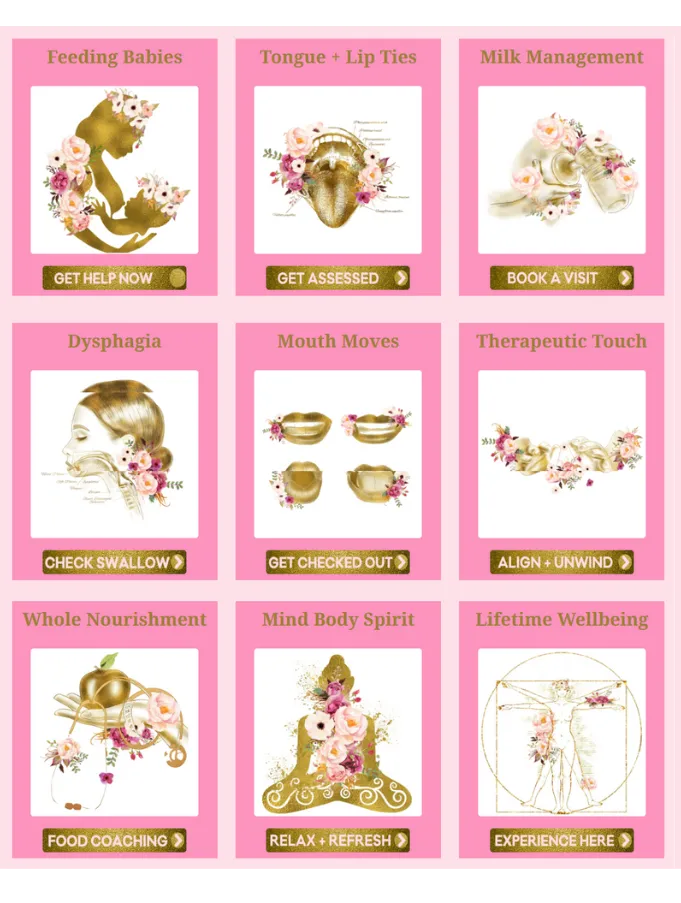
Here are some frequently asked questions (FAQs) related to our work together
feeding babies, toddlers, and introducing solid foods.

Do you have a gut feeling that your baby isn't feeding or eating like other babies their age, but you're unsure if it's a cause for concern?
Have you tried different feeding approaches or techniques without achieving the desired results?
Are you looking for guidance on how to navigate feeding challenges with your baby?
Want to just be sure and confident everything is developing the "right" way?
Providing guidance, expertise, and support to help you get things right for you.
Brief answers to common questions
Baby Time!
Eating, Resting, Playing, Being!
Activities turn to skills in fun and real ways.
Tummy + Belly Time
Tummy Time. isn't a "have to", like making your baby do it even when they cry. This is doing the activity and making them stand it for the time "they say" versus making it a fun and developmental supportive activity. Try placing your baby on their tummy for a short period and build up from there. sing songs offer toys in ways that keep focus and distract. not sure how or what? come to a session to learn the basics, in a group or 1:1.
Eat + Meal Time
Sleep + Rest Time
Bath + Water Time
Play + Just Being Time
Should I start solids, when, how and why?
While it is still common to recommend beginning by the age of 6 months, starting solids is way more than age;
To eat well is a skill set, these skills are strengthened and honed by all the play, sleep and activities in :Baby Times!"
Some babies are ready to start foods earlier and some later.
When and how you introduce foods matters and is especially true with other concerns or difficulties with latch, feeding, reflux, weight gain, tongue/lip tie, prematurity or any other difference impacting feeding and nutrition.
Let's talk! Learn to look for signs of readiness and have fun introducing foods in perfect ways for your baby!
How do I know if my baby is ready for solids?
There are many ideas of what is right. Much of it is cultural or even what “they” are saying.
There is a right time and way to start solids for YOUR baby.
What is your custom and ideal way?
Having a series of sessions can make this big transition go more easily.
Basically:
Baby should be able to sit upright, well. this means leaning foward while keeping balance, moving their tongue independently from their jaw and side to side; good hand ey coordiation and reflex and nervous system integration. Eating is a whole thing! IT's fun and easy especially when you are supporting baby in their right way.
What are some appropriate first foods for my baby?
What and how do you eat as a family? Optimal nouirishment is more that what food you put in. Food in the beginning is an exploriation, a time to experiment and talk trhough what is working for your baby and family. Mealtimes are the best times to gather. studies show that kids are healthier and develop more optimally when families eat together. Maximize this habit for lifetime wellbeing- the well nourished family starts now.
How often should I feed my baby solid foods?
Food is an experience! It should be fun! Use it as an activity and exploration time. How much and how often depends on many factors. This is what you discover when you have a solid food feeding plan.
Letting go of amounts, "shoulds" "have to's" and "when" can be easy when you are clear how baby is responding and exactly what is right for you to do with and for your baby.
Should I offer breast milk or formula alongside solid foods?
These are personal questions with right answers unique to each family and individual. What is right for your baby?The answers are as unique as you. Taking into account health, history, lifestyle, family meal ideas and culture, temperament, development and uniqueness of each child and family.Your best answers will emerge as you try out what is suggested for you. These are also ideal questions to bring up to your baby's medical provider to start this important and ongoing collaborative dialogue.
How can I prevent choking when introducing solids?
Making sure that your child is ready for the consistency you are giving them is the first thing.
knowing the right size of the bite and the skills and movements of the mouth you are waiting for.
Are there teeth or not? How is baby balancing and sitting?
Mostly now advised is focused on the age and the number, the weight and the amount. this extends to feeding solids. When foods are given based on skill choking is prevented anbd risk is minimized when
the right foods at the right time are introduced.. Not sure what they are? A consult with Julee can help you.
In person or virtual, this information can ease your worry.
What about food allergies?
Many times allergies are to blame when kids have digestive or skin conditions when they begin eating foods. Is it allergies? I is hard to always say and can really cause anxiety for parents. With questions about feeding, what and how much, which foods are tolerated, answers are often by process of elimination and experimentation. Seeing providers who are able to help you see what is going on and address this in a comprehensive way can often support faster and easier solutions. Be sure what your child is tolerating, it's going down easy and you've ensured optimal nutrition. Way to go parents!
What are some signs that my baby is full or not interested in eating?
Look for cues such as turning their head away, closing their mouth, or becoming easily distracted. Most babies have natural self-regulation, but these cues are subtle and easily missed. If you'd had trouble with latching or have been worried your baby isn't getting enough, knowing how much and when to give solids might be confusing.
It is never too late and always a good time to get clear on what is going on for your child and how to help make sure things are going as best as possible.
There is confusion about when to introduce the bottle or solids, how much to, why and how often.
These activities are frequently ruled by time versus waiting for the cue from the baby, child or our bodies.
Learning to read and recognize the signs of hunger and satiation are parts of the skills of eating and mealtime.
These aspects of healthful eating are addressed during our sessions.
Is making food for baby a big deal?
There are many ways to easily prepare foods and are naturally a great first food consistency.
Food for baby in the beginning is not in big amounts. Food is for the experience at first anyway.
Whatever you give, give it in a way that makes food fun! Also sometimes just baby sitting in their chair at the table, watching what is going on, smelling food and being part of the mealtime, is the best first step.
Babies learn to eat and manage mealtime from following examples.
What kind of eater example are you? How do you envision "good" eating and great mealtimes?
Let's get together to go beyond the numbers, standards and norms.
Making your own foods? Wanna get in community with other moms? Join our mom community which is open to babies and families when it will best help them. The first step is always a consult. Let's find out what is going on specifically for you.

Quick Links
Privacy Policy
© 2024 Feeding Babies. All rights reserved.

